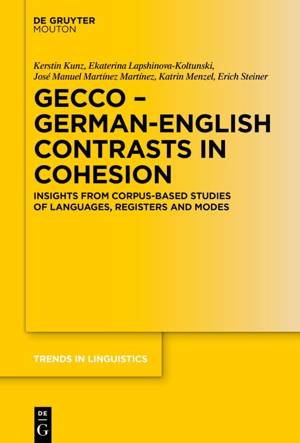
- Retrait gratuit dans votre magasin Club
- 7.000.000 titres dans notre catalogue
- Payer en toute sécurité
- Toujours un magasin près de chez vous
- Retrait gratuit dans votre magasin Club
- 7.000.0000 titres dans notre catalogue
- Payer en toute sécurité
- Toujours un magasin près de chez vous
Gecco - German-English Contrasts in Cohesion
Insights from Corpus-Based Studies of Languages, Registers and Modes
Kerstin Kunz, Ekaterina Lapshinova-Koltunski, José Manuel Martínez Martínez, Katrin Menzel, Erich SteinerDescription
In contrastive linguistics of English and German, there is a tradition of accounting for contrasts with respect to grammar and, to a lesser extent, for lexis and phonetics. Moving on to discourse and text, there is a sizeable body of literature on cohesive patterns in English and German respectively - but very little in terms of a comparison. The latter, though, is of particular interest for language learners, translators and, of course, linguists and researchers in language technology.
This book attempts to close this gap, based on a number of years of corpus-based study into variation and cohesion in the two languages. While there is an overall focus on language contrasts, it also investigates variation between different registers language-internally, and between written and spoken mode in particular. For each of the five major types of cohesion (co-reference, substitution, ellipsis, conjunctive relations and lexical cohesion), overviews are given of contrasts in the system and of contrastive frequencies in texts.
Results and methods presented in this book are thus relevant for language teaching, translation, language technology and corpus-based work on English and German generally.
Spécifications
Parties prenantes
- Auteur(s) :
- Editeur:
Contenu
- Nombre de pages :
- 288
- Langue:
- Anglais
- Collection :
- Tome:
- n° 355
Caractéristiques
- EAN:
- 9783110711059
- Date de parution :
- 25-10-21
- Format:
- Livre relié
- Format numérique:
- Genaaid
- Dimensions :
- 156 mm x 234 mm
- Poids :
- 580 g

Les avis
Nous publions uniquement les avis qui respectent les conditions requises. Consultez nos conditions pour les avis.






